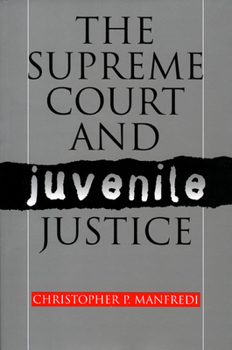The Supreme Court and Juvenile Justice
Select Format
Select Condition 
Book Overview
Over the past century, attitudes toward juvenile crime have alternated between rehabilitation and crime control, and even now are being revised in response to increasing gang violence. But by the 1960s, it had become obvious that juvenile offenders were being deprived of fundamental rights, leading Supreme Court Justice Fortas to declare that "neither the Fourteenth Amendment nor the Bill of Rights is for adults alone." The Supreme Court and Juvenile Justice takes in a century of change to focus on how the Supreme Court brought the juvenile court system under constitutional control. It describes in detail the case of Gerald Gault, an Arizona teenager who was sent to reform school for making an obscene phone call. Christopher Manfredi takes readers behind the scenes in this case to review its progress through the judicial system, discuss all pertinent briefs, and analyze the Supreme Court's 1967 decision that Gault had been denied due process. As background to Gault, Manfredi also examines Kent v. United States (1966), which involved a juvenile accused of rape and robbery who was handed over to criminal court. He then reviews the significant cases following Gault--notably In re Winship (1970) and McKeiver v. Pennsylvania (1971)-and considers how the Supreme Court's "constitutional domestication" of juvenile courts affected further development of juvenile justice policy. In re Gault was the first and most extensive decision imposing constitutionally-derived standards of due process on juvenile courts; yet it has received little attention in the literature because of its lack of drama and visibility. In showing how juvenile court reform became part of the constitutional agenda of the 1960s, Manfredi demonstrates why Gault became the principal vehicle for carrying out that reform and provides a means for better understanding the nature and limitations of social reform litigation.
Format:Paperback
Language:English
ISBN:0700610286
ISBN13:9780700610280
Release Date:November 1997
Publisher:University Press of Kansas
Length:272 Pages
Weight:2.10 lbs.
Dimensions:0.6" x 6.2" x 9.3"
Customer Reviews
0 rating





